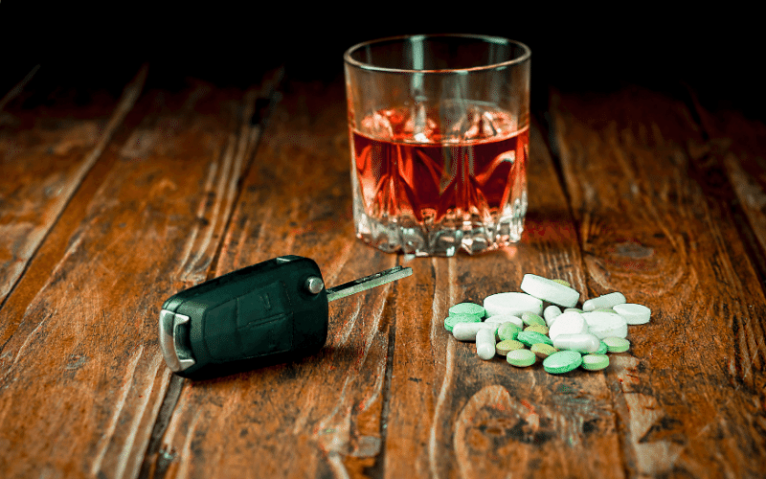Vicodin and Alcohol
Simply put, mixing Vicodin and alcohol is a recipe for disaster. The two chemicals interact with each other in such a way that overdose and negative side effects are common. That’s to say nothing of the strain they place on the liver and other major organs.
So, it’s best to avoid mixing Vicodin and alcohol. There are, however, certain situations where someone unknowingly combines the two. There are also situations, like mine, where addicts and alcoholics take Vicodin and alcohol together to produce a stronger high.
But why are hydrocodone and booze so deadly together? More to the point, why are they such a popular combination? We’ll find out as we examine common Vicodin and alcohol effects, as well as what’s contributed to their massive popularity.
Vicodin and Alcohol Effects
To understand how Vicodin and alcohol interact, we first need to understand how each works on their own.
Vicodin, which goes by the chemical name hydrocodone, is a semisynthetic opioid. This means it’s made from naturally occurring substances but is refined and processed to get the final product.
Hydrocodone is then mixed with acetaminophen to produce Vicodin. It comes in a variety of strengths, the most common of which are 5 milligrams, 7.5 milligrams, and 10 milligrams (the acetaminophen is 500 milligrams, 750 milligrams, and 1000 milligrams, respectively).
Hydrocodone is a central nervous system (CNS) depressant. This means it slows how the body sends and receives signals. It causes decreased respiration and nerve signals. Hydrocodone has also been known to cause vomiting.
Acetaminophen, on the other hand, doesn’t slow the body’s nerve signals down. What it does do is block pain signals from reaching the brain. It also harms the liver and stomach lining in high doses.
Effect On The Body
Alcohol is a CNS depressant. Much like hydrocodone, it slows the body’s respiration and functioning. However, it does this in different ways than Vicodin. The specifics aren’t important, but suffice it to say that alcohol is not an opioid. Alcohol, again much like Vicodin, puts significant strain on the liver and causes vomiting.
So, Vicodin and alcohol’s effects are similar in nature. That means that, when combined, they’re quite dangerous. Taking two CNS depressants at once dramatically slows respiration, heartbeat, and nerve signals. Taking both at once leads to hypotension or very low blood pressure. Mixing hydrocodone and alcohol also puts a lot of stress on the liver.
It’s for these reasons that Vicodin and alcohol’s effects are so deadly. They make the individual effects of each other stronger. It isn’t an understatement to say that taking both at once is rolling the dice with overdose and death.
Mixing Vicodin and Alcohol
Now that we understand the effects of Vicodin and alcohol, let’s look at why people mix them in the first place. Well, to begin with, both Vicodin and alcohol are incredibly popular in the US.
In fact, as of 2007, the United States was responsible for 99% of the world’s consumption of hydrocodone! That’s almost scary to think about. Our country takes 99% of the entire world’s supply of hydrocodone, most of it in the form of Vicodin.
As for alcohol, well, that’s America’s drug of choice. Almost 90% of the adult population drank in 2012. Again, that number is so high it’s almost scary to think about.
Now, most of the people taking Vicodin and drinking alcohol aren’t abusing either. Most people taking Vicodin are prescribed it out of medical necessity for chronic pain or some other condition. Most people drinking are having one drink each night with dinner.
It’s when these two worlds collide that disaster ensues. Despite having a label on hydrocodone bottles that says not to take this medicine with alcohol, many people don’t see the danger and having one drink while taking opioid painkillers.
To be fair, the immediate dangers from a therapeutic dose of Vicodin and one drink aren’t huge. However, it’s still dangerous. Even more dangerous are those who mix Vicodin and alcohol because they’re chasing after a buzz.
I certainly fell into the latter category. I knew the dangers that opioids and booze possessed and I took them both anyway, willingly risking my life in search of a high. That’s what active addiction will do you. It’ll make you take incredible risks. It’ll make you disregard your own safety for a fleeting feeling.
So, whether you’re someone who’s unaware of the dangers that mixing Vicodin and alcohol brings, or you’re someone who simply doesn’t care, don’t do it! Obviously the solution to mixing potent chemicals, the solution to addiction, is much more complicated than saying “don’t do it.” Still, that’s as good a place as any to start.









